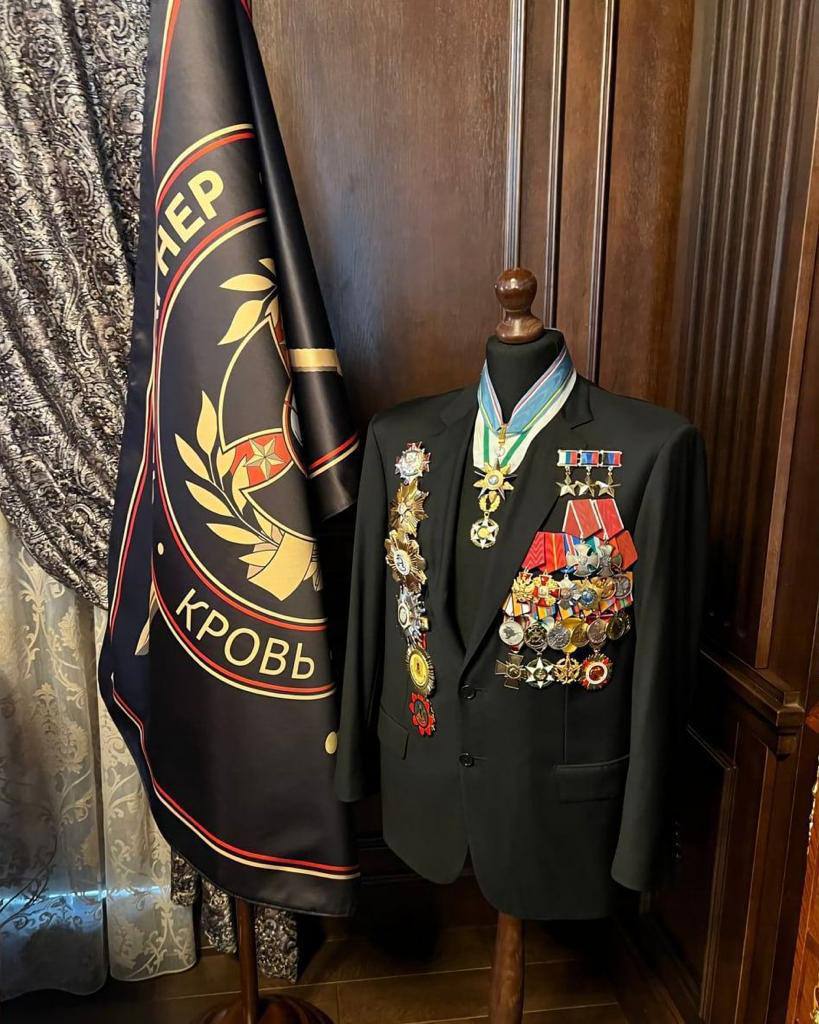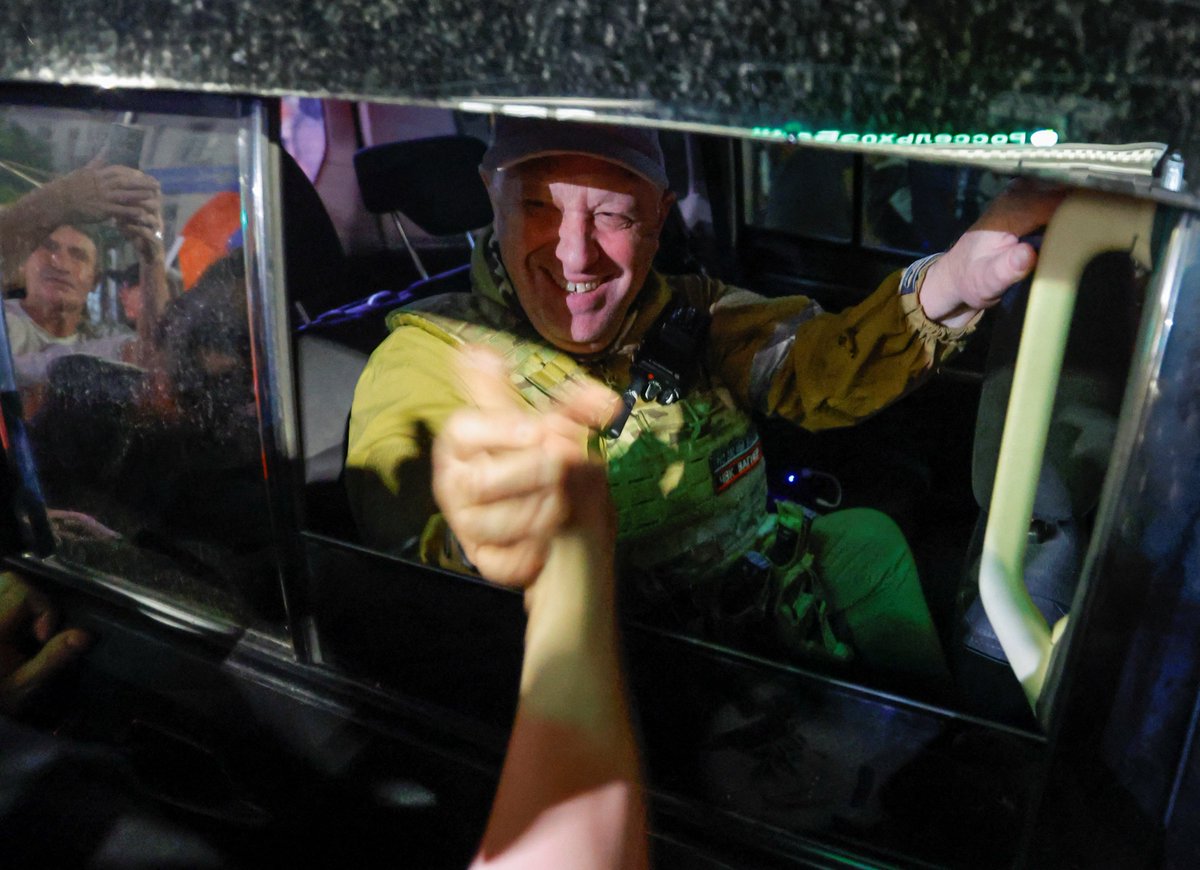1/ Mobilised Russians from the 1452nd Regiment say they have been "sent for slaughter" against "Germans, Poles and Negroes", suffered heavy casualties in a Ukrainian encirclement, and that men who have lost arms or legs are being sent back to the front line to fight. ⬇️
2/ The men's wives posted an appeal on their behalf in late June, in which they spoke of the heavy losses being sustained fighting against Ukrainian tanks and artillery while armed only with rifles and grenades.
https://twitter.com/wartranslated/status/1674506072868941853
3/ One of the men, Mikhail from the Irkutsk region, has spoken to the 'People of Baikal' website about his experiences. The whole interview is worth reading in translation:
4/ "I have a wife, two children, and I went to serve voluntarily. I thought it was better to prevent it there than for them to come to your house later. After all, we haven't been at war with the Khokols [Ukrainians] for a long time, but with the Americans, with all of Europe.
5/ "My relatives were against it, but I didn't listen to anyone.
On 28 September, I was conscripted and sent to the 1452nd regiment in Novosibirsk for training. A whole trainload was brought in - 800-900 men. There was nothing there, just ruined barracks.
On 28 September, I was conscripted and sent to the 1452nd regiment in Novosibirsk for training. A whole trainload was brought in - 800-900 men. There was nothing there, just ruined barracks.
6/ "The first two days we slept in some cabins on a cold tiled floor. We had no normal clothes; in a single day all the buttons on our jacket tore off. We wore uniforms we bought ourselves.
7/ "I was alarmed by the fact that there was no stamp in our military cards – only an inscription in pencil with the number of regiment, battalion and company. The officers said that all the data was stored in a computer.
8/ "So, if something happened, we pressed the delete button and that was it, we were gone.
A month later we arrived in the town of Millerovo in the Rostov region, where we camped in the fields. I think there were at least three thousand of us. No provisions.
A month later we arrived in the town of Millerovo in the Rostov region, where we camped in the fields. I think there were at least three thousand of us. No provisions.
9/ "It was good that we managed to buy cooking pots, shovels, generators, quadrocopters in Novosibirsk.
For one tent, where about 45 people lived, we were given only 15 litres of hot food a day, plus some gingerbread and biscuits.
For one tent, where about 45 people lived, we were given only 15 litres of hot food a day, plus some gingerbread and biscuits.
10/ "We travelled to the nearest villages, bought meat from people ourselves and then cooked normal food. The locals treated us differently, but still better than some officers who could only yell and line us up in the fields.
11/ "I asked one: "Why did you line up the whole regiment in a bare field? What if [an attack] comes at us now?" He replied, "When it comes, then we'll think about it."
12/ "Five days later we were taken away from Millerovo to go to the war zone. They said that we would stand in Svatove in the "green" area [the territory that was previously captured by Russia and had to be garrisoned].
13/ "But we were thrown to the village of Chervonopopivka [near Kreminna], where Khokols and mercenaries – Germans, Poles and Negroes – were waiting 200 metres away. 

14/ "We had no sooner unloaded than mortar and tank shelling started. The guys began to scramble away. We spent the night under some wagons. When dawn broke, we went to occupy abandoned houses.
15/ "Since these used to be their [Ukrainian] positions, they knew all the points, and they were clearly shooting at us. There were drones flying everywhere: you run around and you don't know when you will get hit.
16/ "There was complete confusion, and they were shooting at us, and our own side were shooting at us by mistake.
17/ On New Year's Eve, we were hit hard. In January, I was wounded. Four of us were at the position, and then the shelling started – mortars and a tank were working. We climbed into the basement, I was closer to the exit when a shell came.
18/ "I was unconscious for about five minutes, when I woke up I had a terrible headache, as if I was electrocuted, sparks in front of my eyes like from welding. I received shrapnel wounds to my head, both arms and legs, two broken ribs, contusion of eardrums.
19/ "The guys applied tourniquets, I refused promedol [trimeperidine] as I was moving quite well myself due to the adrenaline rush. We were all injured, but, thank God, we survived.
20/ "On TV we are told about successes in the war. They exist, but at what cost? From the very first days there were heavy losses among the rank and file and officers. Now [with the beginning of the AFU counter-offensive] this has taken on global proportions.
21/ "Guys who are fighting there told me that on 20 June the Khokols enclosed a whole battalion in a ring and opened fire. During the battle, the commander asked for artillery support, but there was none, and the boys were stupidly abandoned.
22/ "Now there's not even a company of them left.
The fact that mobilised men go with machine guns against tanks is half true. You can go without a rifle at all – when ammunition runs out and they don't bring new supplies, you run with it like with a stick.
The fact that mobilised men go with machine guns against tanks is half true. You can go without a rifle at all – when ammunition runs out and they don't bring new supplies, you run with it like with a stick.
23/ "I know that after that battle the bodies of the guys have not been taken away yet – it is impossible to get to them because of the constant firefights. There's bodies that weren't picked up even earlier.
24/ "Nobody wants the truth. About the numerous losses due to the fact that the mobilised were sent to slaughter, and experienced contract soldiers guard warehouses and shops. Although we are promised the opposite.
25/ "About the fact that weapons and uniforms, which are handed over to us by volunteers, are deposited in the Luhansk region. Some individuals and officers take it for themselves and try to sell it to us at an inflated price.
26/ "About the fact that there are orders to "zero out" [kill] our own men. We are talking about those who have gone mad or just got drunk and started shooting indiscriminately, giving away their location.
27/ "Then the order comes over the radio – if a person does not calm down in 15 minutes, he must be shot. And it doesn't matter whether it's your friend or your brother.
28/ "Now I'm in a Russian hospital, and I've changed hospitals 13 times before. Ahead of the medical commission, I hope that I will be recognised as unfit for military service. But in order to get category "D" you have to be a corpse or lying down.
29/ "In our time, guys without an arm or a leg were given categories "A", "B" [fit for duty] and sent to the front line.
There are multiple pieces of shrapnel left in me. Apart from the pain, my head is a mess.
There are multiple pieces of shrapnel left in me. Apart from the pain, my head is a mess.
30/ "I go to bed or drive, and I see this shell flying at me. I took a picture of it somehow in my memory. I'm a man, but it brings tears to my eyes. Especially since there could be a road back [to the war] ahead. God saved me once, but there may not be a second time."
• • •
Missing some Tweet in this thread? You can try to
force a refresh

 Read on Twitter
Read on Twitter












